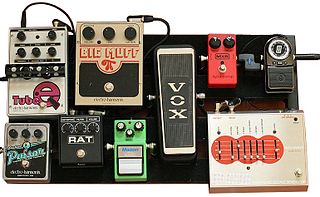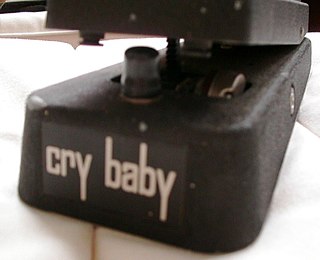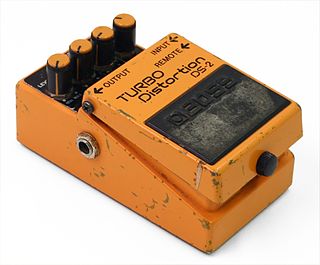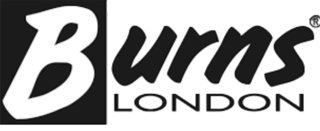
An effects unit or effects pedal is an electronic device that alters the sound of a musical instrument or other audio source through audio signal processing.

John Alec Entwistle was an English musician who was the bassist for the rock band the Who. Entwistle's music career spanned over four decades. Nicknamed "The Ox" and "Thunderfingers", he was the band's only member with formal musical training and also provided backing and occasional lead vocals. Entwistle was inducted into the Rock and Roll Hall of Fame as a member of the Who in 1990.

Vox is a British musical equipment manufacturer founded in 1957 by Thomas Walter Jennings in Dartford, Kent, England. The company is most famous for making the Vox AC30 guitar amplifier, used by The Beatles, The Rolling Stones, The Kinks, The Yardbirds, Queen, Dire Straits, U2, and Radiohead; the Vox Continental electric organ, the Vox wah-wah pedal used by Jimi Hendrix, and a series of innovative electric guitars and bass guitars. Since 1992, Vox has been owned by the Japanese electronics firm Korg.

Peter Dennis Townshend is an English musician. He is co-founder, leader, guitarist, second lead vocalist and principal songwriter of the Who, one of the most influential rock bands of the 1960s and 1970s. Due to his aggressive playing style and innovative songwriting techniques, Townshend's works with the Who and in other projects have earned him critical acclaim.

Audio feedback is a positive feedback situation which may occur when an acoustic path exists between an audio input and an audio output. In this example, a signal received by the microphone is amplified and passed out of the loudspeaker. The sound from the loudspeaker can then be received by the microphone again, amplified further, and then passed out through the loudspeaker again. The frequency of the resulting howl is determined by resonance frequencies in the microphone, amplifier, and loudspeaker, the acoustics of the room, the directional pick-up and emission patterns of the microphone and loudspeaker, and the distance between them. The principles of audio feedback were first discovered by Danish scientist Søren Absalon Larsen, hence it is also known as the Larsen effect.

A wah-wah pedal, or simply wah pedal, is a type of electric guitar effects pedal that alters the tone and frequencies of the guitar signal to create a distinctive sound, mimicking the human voice saying the onomatopoeic name "wah-wah". The pedal sweeps the peak response of a frequency filter up and down in frequency to create the sound, a spectral glide, also known as "the wah effect". The wah-wah effect originated in the 1920s, with trumpet or trombone players finding they could produce an expressive crying tone by moving a mute in and out of the instrument's bell. This was later simulated with electronic circuitry for the electric guitar when the wah-wah pedal was invented. It is controlled by movement of the player's foot on a rocking pedal connected to a potentiometer. Wah-wah effects may be used as a fixed-filter to alter an instrument’s timbre ; they may be used when a guitarist is soloing; or, classically, they may be used to create a "wacka-wacka" funk-styled rhythm for rhythm guitar playing.

Marshall is a British company that designs and manufactures music amplifiers, speaker cabinets, brands personal headphones and earphones, drums and bongos. The company also owns a record label called Marshall Records. It was founded in London by drum shop owner and drummer, Jim Marshall, and is now based in Bletchley, Milton Keynes, England.

Premier Music International Limited is an English musical instruments manufacturing company based in Kibworth. The company, founded in 1922, currently produces drum kits, sticks and accessories.

Hiwatt is a British company that manufactures amplifiers for electric guitars and electric basses. Starting in the late 1960s, together with Marshall and Vox, Hiwatt contributed to the sonic image popularly termed "British sound".

James Charles Marshall known as The Father of Loud or The Lord of Loud, was an English businessman and pioneer of guitar amplification. His company, Marshall Amplification, has created equipment that is used by some of the biggest names in rock music, producing amplifiers with an iconic status. In 2003 Marshall was awarded an OBE at Buckingham Palace for "services to the music industry and to charity". In 2009 he was given the Freedom of the Borough of Milton Keynes for his work in the community.

The Fuzz Face is an effects pedal for electric guitar, used also by some electric bass players. It is designed to produce a distorted sound referred to as "fuzz", originally achieved through accident such as broken electrical components or damaged speakers.

Distortion and overdrive are forms of audio signal processing used to alter the sound of amplified electric musical instruments, usually by increasing their gain, producing a "fuzzy", "growling", or "gritty" tone. Distortion is most commonly used with the electric guitar, but may also be used with other electric instruments such as electric bass, electric piano, synthesizer and Hammond organ. Guitarists playing electric blues originally obtained an overdriven sound by turning up their vacuum tube-powered guitar amplifiers to high volumes, which caused the signal to distort. While overdriven tube amps are still used to obtain overdrive, especially in genres like blues and rockabilly, a number of other ways to produce distortion have been developed since the 1960s, such as distortion effect pedals. The growling tone of a distorted electric guitar is a key part of many genres, including blues and many rock music genres, notably hard rock, punk rock, hardcore punk, acid rock, and heavy metal music, while the use of distorted bass has been essential in a genre of hip hop music and alternative hip hop known as "SoundCloud rap".

The Fender Twin and Twin Reverb are guitar amplifiers made by Fender Musical Instruments Corporation. The Twin was introduced in 1952, two years before Fender began selling Stratocaster electric guitars. The amps are known for their characteristically clean tone.

Burns Guitars London is an English manufacturer of electric guitars and bass guitars, founded by Alice Louise Farrell (1908–1993) and James Ormston (Jim) Burns (1925–1998) in 1959. The company was first named "Burns-Weill", then renamed "Ormston Burns Ltd". At its peak, in the 1960s, it was the most successful guitar company in England.
Jennings Musical Instruments is a manufacturer of musical instruments, and the original owner of the Vox brand. The company was founded by Thomas Walter Jennings.
This is a history of the equipment that the English rock band The Who used. It also notes their influence on the instruments of the time period.

Watkins Electric Music (WEM) is a British company known for manufacturing PA systems, the Copicat tape echo unit, guitar amplifiers, and electric guitars.

The Marshall Major was a bass guitar amplifier made by Marshall. It was introduced in 1967 as the "Marshall 200". It had a plexi panel and two inputs in one channel, but in contrast with the 100 watt heads made by Marshall, the first series had split tone controls similar to the Sound City amps. For the second series, in late 1968, Marshall reverted to ordinary passive tone controls, and was called "Marshall Major". Some authors claim the first version had active tone controls but this is incorrect, the schematics for all versions are available online.
The Marshall Super Lead Model 1959 is a guitar amplifier head made by Marshall. One of the famous Marshall Plexis, it was introduced in 1965 and with its associated 4×12″ cabinets gave rise to the "Marshall stack".

The Marshall JTM45 is the first guitar amplifier made by Marshall. First produced in 1963, it has been called a "seminal" amplifier, and is praised as being among the most desirable of all the company's amplifiers.
















